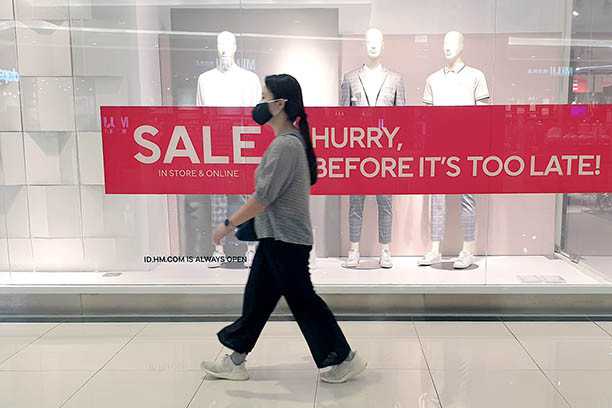‘Alive but type of dead’: Retailers to see slow recovery despite restrictions easing
28 June, 2020

Easing mobility constraints in a variety of regions across Indonesia will not provide an instant enhance to the country’s retail sector since wary consumers are likely to still limit their retail outlet visits amid a reliable rise in COVID-19 cases, analysts have said.
Mirae Asset Sekuritas Indonesia economist Anthony Kevin found that customers did not immediately flock to shopping malls despite the reopening, adding that even those visiting malls even now avoided durable goods stores.
“Alive but type of dead. This is exactly what we assumed when visiting many malls in Jakarta and Bekasi [in West Java] as we discovered that people are still holding back from going to malls,” he wrote in a research note dated June 19.
“Found in stark contrast to the minimum-to-no visits to durable goods, besides F&B [foodstuff and beverages] stores, persons are still rushing to supermarkets to buy basic necessities, even while staying vigilant about maintaining their well being by purchasing vitamins in drug stores.”
The large-scale social restrictions (PSBB) implemented in a number of regions, such as for example virus epicenters and business centers Jakarta, Bandung in West Java and Surabaya in East Java, forced retailers, factories and offices to shut down to support the coronavirus pass on, severely limiting require as people stayed at home.
Retail revenue slumped by 7.5 percent year-on-year (yoy) in April, signaling weaker private consumption. Meanwhile, the trade, services and investment sector on the Indonesia Stock Exchange (IDX) has documented a 21.87 percent fall up to now this season as investors have dumped such stocks. The main gauge, the Jakarta Composite Index (JCI), lost more than 22 percent of its value through the same period.
Mirae equity analyst Christine Natasya on a study note on June 3 expected the retail sector to recuperate gradually starting the next half of the year following a government’s decision to postpone the Idul Fitri collective holiday to December. The vacation postponement was taken up to prevent people from going on mudik (the Idul Fitri exodus) in order to curb the distributed of COVID-19.
The government’s decision to slowly but surely lift up the PSBB has allowed stores to re-open their doors and retailers to go back to business, albeit in a restricted way and with strict health protocols.
Overall health Minister Terawan Agus Putranto signed on June 19 a decree on wellness guidelines for general public facilities, including hotels, restaurants and shopping malls. Such establishments are appreciated to supply hand sanitizers in public spaces, clean these areas with disinfectant at least 3 x a day and maintain proper ventilation.
It really is mandatory for both employees and guests to undergo temperature checks and wear face masks in these areas. Meanwhile, the 50 percent cap on venue capacity that is widely utilized by businesses is not really contained in the decree, which instead includes a 1-meter social-distancing rule.
Pilarmas Investindo Sekuritas equity analyst Maximilianus Nico Demus also said on Thursday that the malls’ re-opening may not necessarily raise retailers’ performance as the COVID-19 pandemic had displayed no sign of subsiding.
“As long just as the number of confirmed cases has yet showing signs of slowing down, consumers might prefer to save their money rather than shopping,” he told The Jakarta Post over the phone.
Indonesia recorded a lot more than 1,200 new confirmed COVID-19 cases on Friday, bringing the full total infection number to above 50,100 with in least 2,600 deaths, official data show.
Maximilianus believes the recovery found in the retail companies’ performance may not happen before following year.
“The recovery will start to happen if the pass on of the virus declines, scientists discover a vaccine for the virus or the federal government provides a huge fiscal and monetary stimulus package,” he said.
Regardless of the bleak projection, some stocks have an edge over other publicly listed vendors. “Retailers that have an established online presence can reap extra advantages because customers will nonetheless have a shopping alternate,” Maximilianus said.
Publicly listed retailer PT MAP Aktif Adiperkasa chief digital officer Amit Keswani appeared to be managing his company’s expectations, along using its parent company publicly listed PT Mitra Adiperkasa (MAP), about business prospects this season.
“[The year] 2020 is about riding through it, continuing expenditure and connecting with this customers considerably more closely. I don’t think we’ll start to see 2019 numbers until 2021,” he said during an online discussion organized by the British Chamber of Commerce in Indonesia on Tuesday.
MAP Aktif revenue jumped by 19.2 percent yoy to Rp 7.4 trillion (US$517.61 million) on 2019, while its net profits skyrocketed by 96.14 percent yoy to Rp 693.18 billion.
Meanwhile, MAP recorded a 12.47 percent upsurge in revenue to Rp 8.14 trillion last year with net income of Rp 1.03 trillion, up by 6.8 percent yoy.
Source: www.thejakartapost.com
TAG(s):
